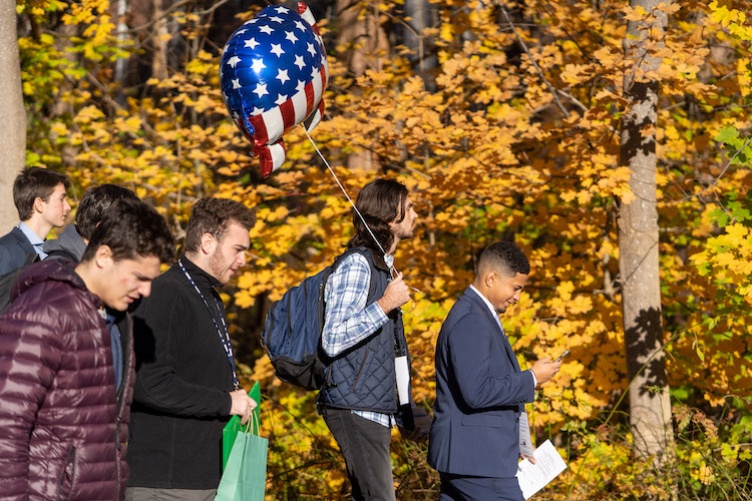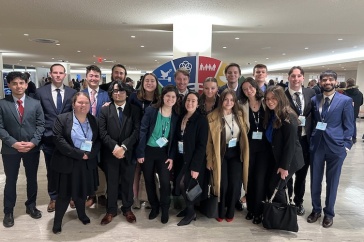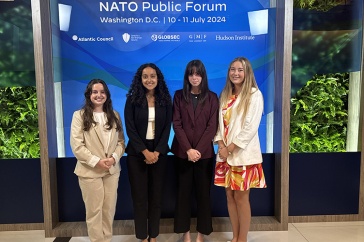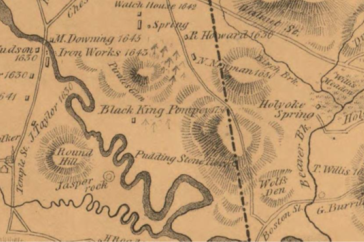
Cameron MacDonald ‘20 holds a political balloon as students head to a mock nominating convention.
There were balloons, red, white and blue, in the shape of donkeys and elephants. Signs for each state in the U.S. plus Washington, D.C., Puerto Rico, American Samoa, Guam and the Northern Mariana and Virgin Islands indicated where delegates sat. At the end of the day, and three rounds of balloting, a Democratic candidate was selected to face President Donald Trump in next year’s presidential election.

A New Jersey “delegate” holds up the state name during roll call.
It was, of course, just an exercise, but one that exemplified how the United States “derives all its powers directly or indirectly from the great body of the people.” The mock nominating convention held at UNH in early November simulated the 2020 Democratic and Republican National Conventions. More than 300 students from UNH and four area community colleges (Great Bay, Nashua, River Valley and Lakes Region) participated in the daylong event, hosted by the College of Liberal Arts and the New Hampshire Humanities Collaborative.
The day began with a roll call of states; the order was based on when their primary or caucus takes place. (Iowa holds the first caucus and New Hampshire’s primary is the first in the nation.) The convention chair then asked the state representatives how their delegates would be allocated.
Students were split into groups of Republicans and Democrats that divided further to debate the issues of citizenship or energy. The four groups then drafted their party’s platform. During the afternoon session, Republicans became Democrats and Democrats became Republicans who, relying on polling data and analysis, predicted the distribution of their delegates; Democrats voted on their party’s presidential nomination.
Cameron MacDonald ‘20 served as chairman for both the Democratic citizenship committee and presidential nomination committee.
“I got involved through Model UN; several of us volunteered to participate, given our knowledge of parliamentary procedure. That helped us be able to run the committees,” MacDonald says. “In the afternoon it was much busier, with the Democrats having so many candidates. It was interesting trying to determine who would get the nomination.”
That turned out to be Sen. Elizabeth Warren but only after it became a brokered convention, which, as Emily Baer-Bositis explains, occurs when a first vote does not produce a majority for a candidate.
“It’s our future, so it’s important that we take a role in it."
“The delegates gave stump speeches, trying to persuade others to vote for their candidate but after the first round of voting, none of the candidates had received a majority,” Baer-Bositis, assistant professor of political science, says. “(Joe) Biden had the largest number of votes but not enough for the majority. So, they voted twice more, until Sen. Warren won the majority.”
Tu Anh Duong ’23 was one of four students representing the state of Michigan. When it came time to discuss citizenship, he says his state was prepared as they had already researched the issue in their American Politics class. After that, the process was new.
“Throughout the day, I was learning as I went. There were some things that I did not know beforehand. Bringing up amendments for consideration, for example, took a lot of votes, and the language itself had to be very clear," he says. “I thought it was good insight into what the real the convention is like and how politics work.”
The diversity of college courses represented — there were 23 — gave students an opportunity to learn from each other, Baer-Bositis says. “I think that all of them walked away with a better understanding of the nomination process. Students were really engaged. Not only did the event promote democracy but it helped them understand the importance of participation. And that showing up matters. Planning matters. Being informed matters.”
MacDonald agrees, saying, “It’s our future, so it’s important that we take a role in it. I encourage all young voters to get out and vote, but we need to keep in mind that we must be educated on the issues. I think an uneducated voter is far more dangerous than someone not voting at all.”
















































